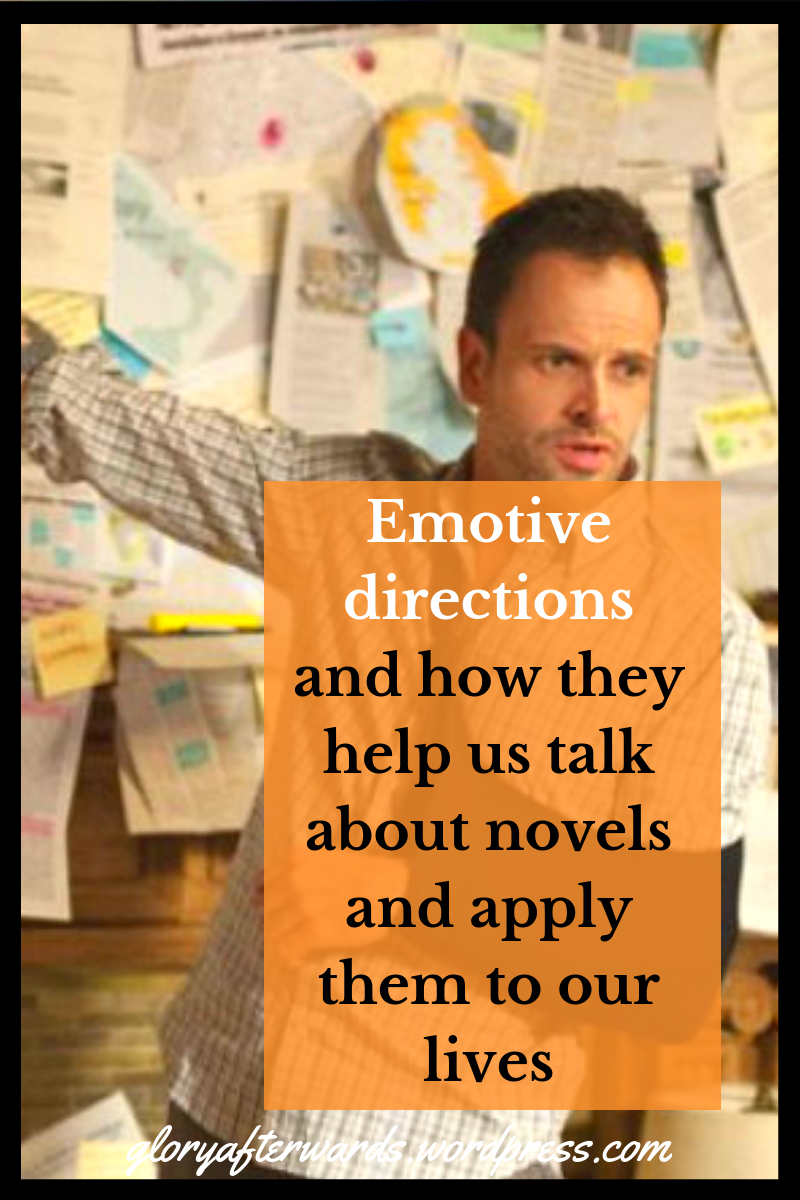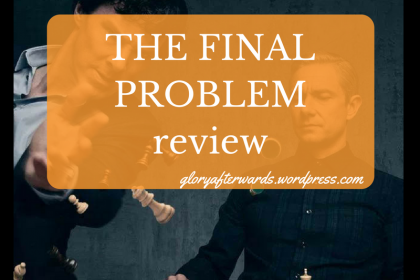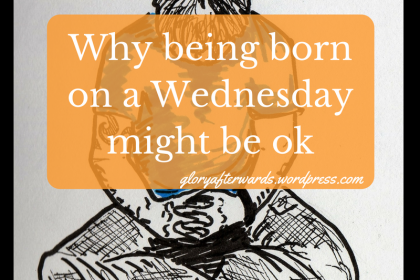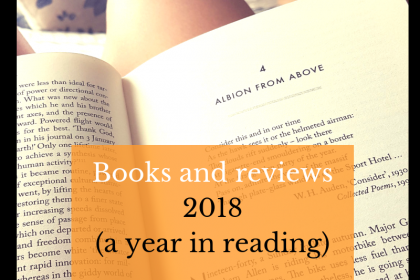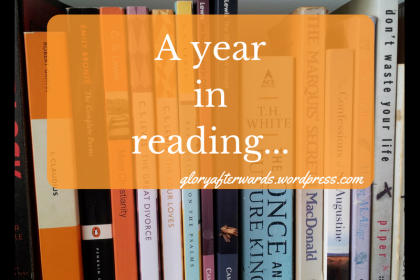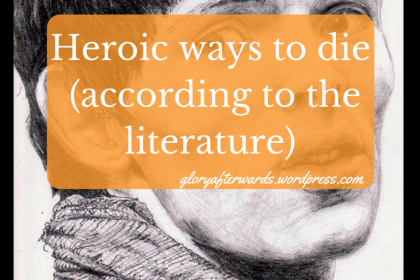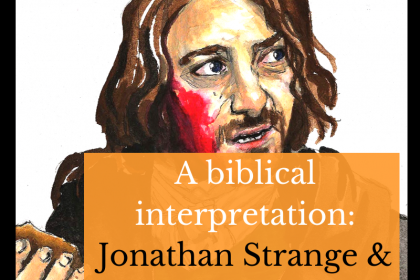I am rather dismissive of allegories. As a child I found them profoundly disappointing. I’d begin reading what I thought was a “new” story.. Only to discover a quarter of a way through that I’d been “tricked” and it was actually an “old” story in disguise.
Allegories have their place… But generally not on my bookshelf. (Disclaimer: I say this having written allegories myself. Also, the Narnia series are not allegorical!)
While I dislike allegories, however, I really like “emotive directions”.
If you’ve never heard of such a term, relax. I made it up.
Emotive Direction:
It is a practical and specific thematic thread which resonates with the reader in both the fictional and the “real” world.
Wait a second, you might be thinking. Isn’t that a fancy word and convoluted description for a “theme”?
No. And here’s why.
You “spot” themes, but you “feel” emotive directions.
Anyone can tell you that a theme of Harry Potter is “life/death,” “friendship” or “magic” – and once told, you will be able to find several examples. It’s very clear cut. It’s either there, or not.
An emotive direction on the other hand, is felt. We know they are there because our emotions are impacted. Or, to be more precise, our emotions are pulled in a certain, specific direction.
You “address” themes, but you “act” on emotive directions.
If you were to receive an essay question which included the phrase “discuss/analyse the themes of the Hunger Games,” you could choose to argue that civil war is good. You could explain that it builds civilizations and purifies nations. As long as your thesis is sound, your essay would be acceptable. It also might be the opposite of what you personally believe.
An emotive direction, however, is much more personal and therefore, applicable. They can be universal, but they don’t have to be. A room of ten people could take a different ‘emotive direction’ from the same text. Because it is a ‘felt’ response, it would become part of their emotional landscape and therefore change them a little.
Some examples:
Can we see the difference between a theme and an emotive direction? Of course, you could argue that an emotive direction is merely the result of an individual consciously applying a theme (a ‘moral’ if you like) – but I disagree. An emotive direction is what it is because it is first felt (and thus applied) and only later (if at all) perceived.
Let me give some concrete examples. Emotive directions must always be proven textually. Otherwise they might simply be facets of my own world view, entirely uninfluenced by the text.
Harry Potter.
The obvious themes, as stated above, are love, friendship, magic, life/death. A recent lecture by Alison Milbank shed some light on what I believe is one of my ‘emotive directions’ in the text:
There are unseen realities which are more important than safeguarding life itself.
Emotionally felt: My favourite characters are those who (at great cost) gave up their lives because they believed in something better, something they never saw. Remus Lupin, Albus Dumbledore, Severus Snape…
Textually proved: Voldemort, the villain, is of course so enamored with life that he will do anything to retain it – to the detriment of the entire wizarding world. Conversely, it is not ‘life’ alone that Harry Potter and his allies are trying to defend, but things they believe to be more important: love, friendship, freedom etc.
Directionally applicable: Having been moved in a positive manner (I admire those characters) I have accepted this emotive direction. I now have a choice: will I let it subconsciously reside in my worldview or will I choose to consciously ‘follow’ the direction?
As a Christian, I do believe there are more important things than earthly life, and so I embrace this emotive direction as a reminder and a challenge: would I be willing to give up my life for truths I hold dear? In what ways am I instead, more like Voldemort?
Sherlock Holmes.
Many critics believe his fame is due to the sense of security we derive from the way he brings order to chaos. I have always found this hard to swallow, partly because as I have argued, we do not recreate Sherlock as we do Shakespeare: we explore him. Again I was influenced by Milbank’s fascinating suggestion that Sherlock Holmes and his flaws are actually a critic of the notion that ‘rationality is enough’:
Logic and rationality alone are not enough to complete a person.
Emotionally felt: I, along with practically every other Sherlock Holmes aficionado ever, long to know more about the ‘man’ behind the ‘machine.’
Textually proven: Every successful adaptation seeks to explore the relationship between Sherlock Holmes and Dr. Watson or Irene Adler in greater detail than the canon provides. We are drawn into the search for the ‘complete man’ because we do not believe that logic is enough. This is evident in the fact that Doyle chooses the highly sympathetic Dr. Watson to be our narrator and mediator. Without him we could not connect with Holmes so well, because Holmes has suppressed part of what makes him human.
Directionally applicable: I see this as a warning… to unreservedly idolise Holmes, or indeed ‘genius,’ is to forget what makes us human.
Jonathan Strange and Mr. Norrell.
Themes include: class, privilege, magic, logic vs. intuition, arrogance vs. fear. This novel resonated with me but it took a while to isolate my specific emotive direction:
It’s a risky and dangerous business to devote your life to an unseen future.
Emotionally felt: I was captured by the idea that while all the magicians long for magic to return, when it does they are not all pleased. I found I admired John Childermass because he had the clearest vision of what it the return would look like (the return of the Raven King).
Textually proven: Mr. Norrell wants magic to return but desires to keep the Raven King away. Mr. Strange thinks he wants the Raven King, but when the king comes, he changes his mind because the king is ‘too much’. Childermass longs for the Raven King and suffers for him, but fails to recognise him once he actually returns
Directionally applicable: Again as a Christian this topic resonated with me. The Jewish nation longed for the kingdom of God to come to earth, and yet when it came in the form of Jesus, He was not at all what they expected, and not what some of them wanted! I am also forced to ask whether I am longing for the final return of the Kingdom of God with the fervour of Childermass’ longing for the Raven King.
So, what do you think?
For me, “emotive directions” are supremely useful in identifying why a novel resonates with me and how I can apply it. It also frees me from the often formulaic thinking of literature as divisible into ‘themes’ and planted-by-the-author ‘morals.’
Further reading: The Christian Imagination – edited by Leland Ryken
image courtesy of CBS
